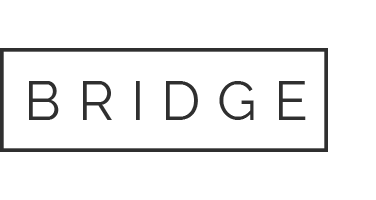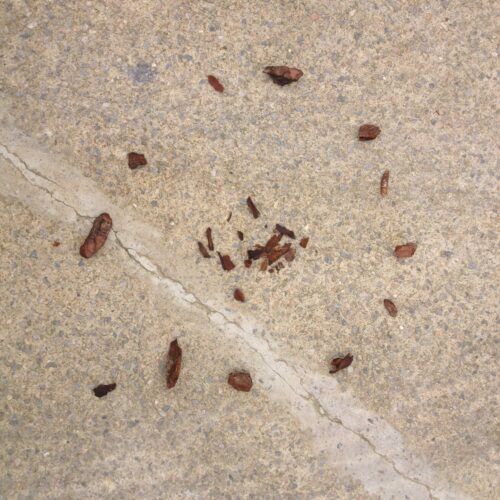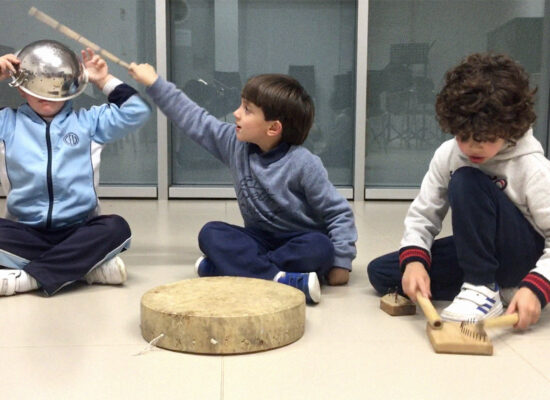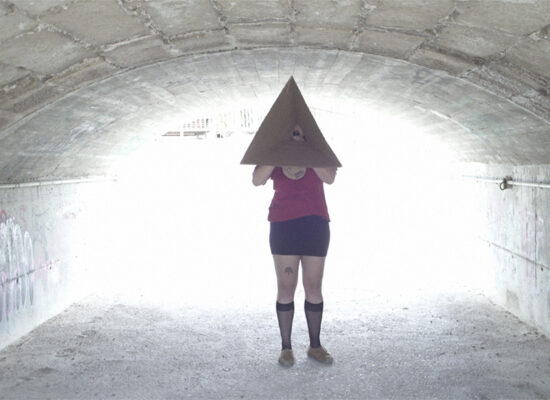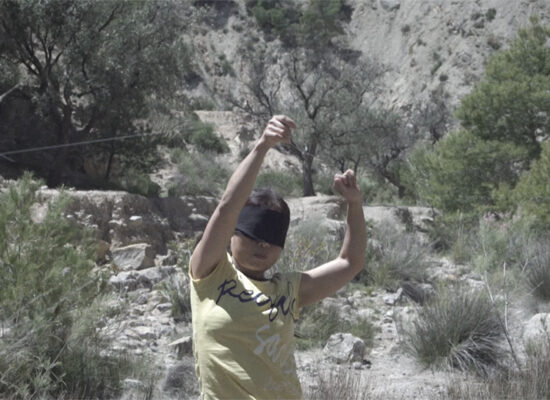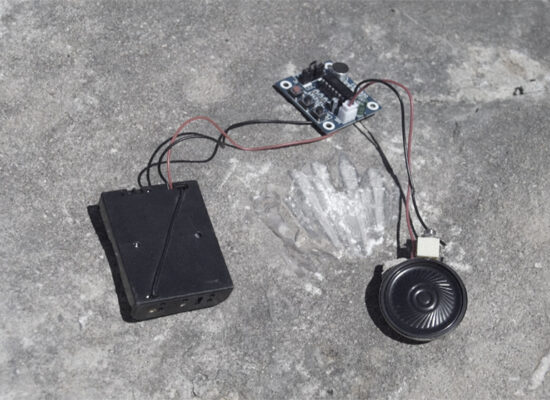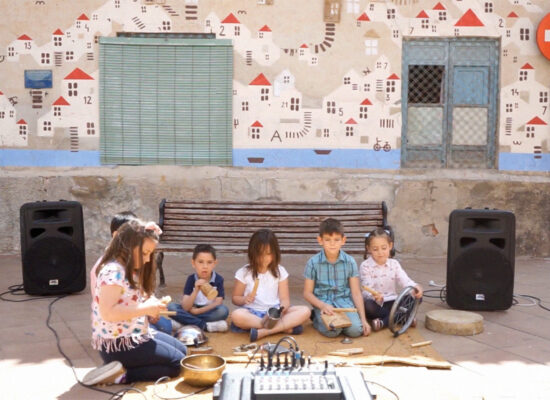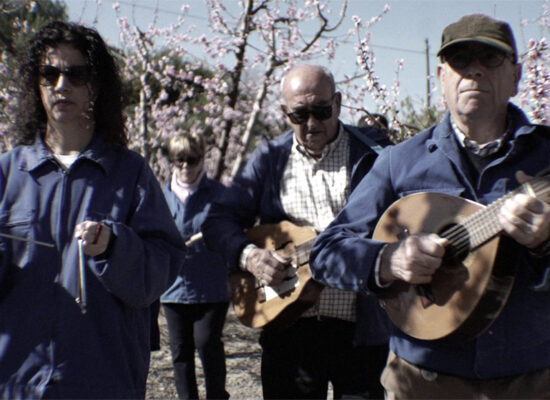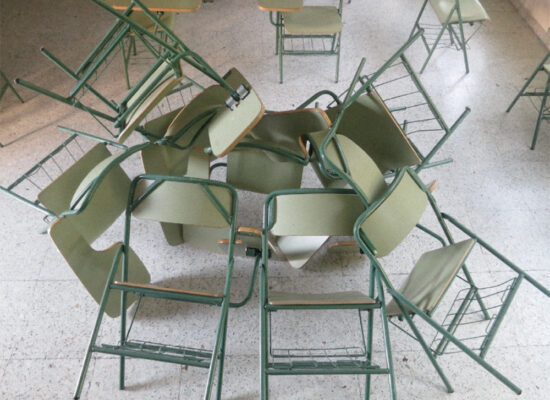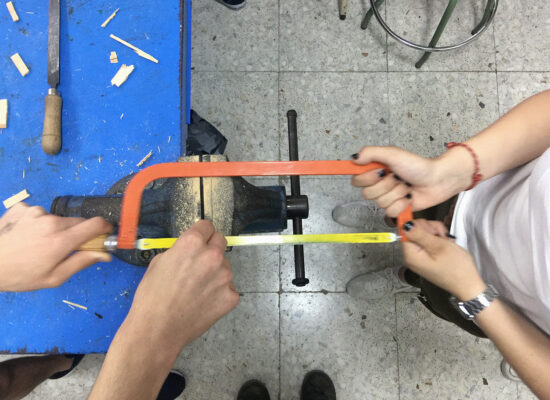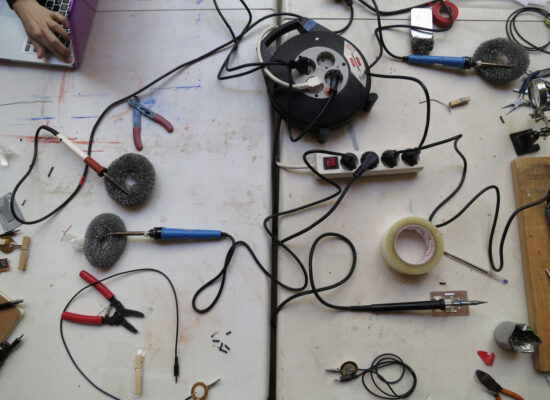AADK Sonora
Experimental School
Sound container of AADK Spain



SONORA is a School of Sound Experimentation established at Centro Negra in Blanca (Murcia, Spain), in the rural environment of the Ricote Valley. Its main aims are: to foster the development of musical pedagogy through creation, to encourage new ways of learning and contemporary thinking through sound experimentation, as well as the cultural dynamization of the Ricote Valley. The project seeks to generate a sense of community through collective creation, play and reflection – addressing issues of gender and cultural diversity as transversal axes – to promote attitudes of collaboration, trust and respect. Thus, Sonora wishes to facilitate transformative experiences through sound to build other imaginaries and stimulate an awareness of acoustic ecology.
A project by AADK Spain
Design and creation: Elena Azzedín y Selu Herraiz
Coordination: Selu Herraiz
Co-produced by: Fundación Daniel y Nina Carasso, that supported the project between 2017-2020.
From 2017 to date, the project has developed various artistic and educational practices that use sound as a medium: concerts, conferences, specialized workshops, seminars, territory mapping, Active Listening practices for children and teacher training in the formal education system. The initiative had the support of the Carasso Foundation until the end of 2020 and has positioned itself as one of the most complete experimental sound programs in Spain.
Currently, this project hosts residencies around sound, continues to develop the sound map of the Ricote Valley, organizes the annual experimental music festival ‘De la Raíz al Noise’ and manages a radio channel in podcast format and its own experimental music label under the pseudonym Aldarrax.
General Objectives
· Encourage new methodologies and forms of musical learning in formal education.
· Introduce a postcolonial and gender perspectives as transversals.
· Emphasise the value of process over results.
· Make contemporary music culture accessible to the rural society.
· Promote equality (gender, race, and class) through collective musical creation in socio-culturally diverse communities.
· Create sound situations of collective participation to develop attitudes of collaboration, trust, respect and empathy.
· Inquire the relational possibilities of music as a universal language.
· Develop an awareness of acoustic ecology and respect for the sound environment.
· Generate a long-term stable project that enable the participants their own learning rithm.
· Promote autonomous learning and active participation.
· Enhance the use of new technologies for a better understanding of current music.
· Create agency in arts and technology by DIY (do it yourself) and DIWO (do it with others) philosophy as well as the use of free software.
Actions
Action1: Active Listening Classes
Creativity as a vital tool. A space to learn to listen and develop a thinking ear. Listen to know the world, listen to know yourself, listen to be free.
Active Listening is a tool that facilitates concentration and other aspects related to cognition, developing different communication strategies. Activating attentive listening as a habitual perceptual practice helps us to be connected with our environment, to improve emotional management and, therefore, communication with others.
METHODOLOGY
Depending on age, work is done differently with each group. With the little ones, the dynamics are very oriented towards the most basic observation and exploration of sound, based on games. As they advance in age, the contents become more complex. Theoretical elements are introduced, approached in a very visual and sonoric way, installing the use of more advanced technologies and reviewing historical and current references.
The classroom becomes a laboratory to enable learning and playing while thinking. A workshop where creativity and noise are used to free imagination. Cross-cutting dynamics are used to reinforce the values of gender, race and class equality. We consider that small gestures produce great transformations.
CONTENTS
1st Block: Active listening
- Body relaxation
- Listening the silence
- Listening the environment
- Dialogue with colleagues
- Description of everyday sounds
Block II: The instrument in experimental music
- The instrument beyond the instrument / The expanded musical instrument
- The everyday object as an instrument
- Non-European instruments
- Construction of homemade instruments
Block III: Experimental music and sound art
- Amplification through contact microphones
- Field recordings
- Soundscape composition
- Sound performance
- Sound installation
Action 2: this is Not a Sound Art Master
Specialized Course in Experimental Music and Sound Art
Imparted by Carlos Suárez
1st edition: March 2018 – June 2019
Open to new proposals
Centro Negra / AADK Spain
#deeplistening #soundexperiments
#education #thinking #imagination
#noise #low-tech #DIY #DIWO
#spatiality #territory
This course is oriented towards the study of the concepts, procedures, and techniques that are necessary for the creation of artistic productions in the fields of experimental music and sound art, as well as the knowledge of tools and methodologies to develop innovative pedagogical programs in the field of musical education.
We work in the intersection between Music, Science, Architecture, Philosophy, and Pedagogy, to create a web of knowledge drawing together fields that perviously were often presented in a fragmented way.
The course is developed in the format of an art residency, providing a space of coexistence with the working group, as well as a more intimate relationship between the participants and the surrounding territory.
The methodology of the course is based on the realization of personal or collaborative projects in relation to the contents of the course, attending to the needs of each participant and in connection with the rural context of the Ricote Valley. A work system based on network thinking and direct experimentation with the sounds, spaces and materials of the area will be applied. We especially delve into analog technologies and the handmade sound universe, relying on digital machinery and specialized software for the development of compositions.
Carlos Suárez is a Galician-Venezuelan sound artist and educator born in Celanova in 1966. Master in composition of the Conservatorio Superior de Música Simón Bolívar de Caracas (specialising in electroacoustics). Ethnomusicologist of the Instituto Universitario de Estudios Musicales de Caracas. Master in electroacoustic composition of the UCV.
Action 3: Experiences of collective creation in relation to the context
Guided experiences by three professional musicians working with different aspects of contemporary music, in collaboration with specific groups of diverse socio-cultural features, to create sonic situations in relation to the surrounding territory.
The process has a marked interdisciplinary character in which music, body and landscape enter into a dialogue. The experiences are carried out in urban or natural spaces in the environment of Blanca and have a visual and performative component.
The invited artists hold a participatory workshop taking shape in the form an orchestra that fuses the traditional music of the valley with contemporary music, collaborating with specific communities of Blanca. Each workshop ends with a concert, a sharing the outcome of the work carried out throughout the intensive weekend.
This set of actions aims to establish a festival which can serve as a point of encounter for musicians of diverse styles, ages and backgrounds: De la Raíz al Noise (From roots to noise), the first Festival of Experimental Music and Collective Creation of the Ricote Valley. The festival is an attempt to create new emotional links through the music and generate, theoretically, a community that is unlikely in principle.
Action 4: Innovation tools in musical pedagogy
A space for thought and debate around pedagogy, to elaborate and share innovative didactic resources to be implemented in the context of formal education. This action is based on the creation of a working group to explore new methodologies for musical pedagogy, aimed at music and technology teachers from primary, secondary school, music teaching, conservatories, fine arts faculties, middle grade and superior training cycles, and music schools.
The aim of this action is to develop educational materials and resources (practical and theoretical) that facilitate the inclusion of new forms of musical creation in the classroom and that allow teachers to integrate other ways of thinking about music as well as the possibilities of new technologies in the formal curriculum.
The proposed contents are:
· Sound as a tool of knowledge and enhancer of imagination.
· Active and deep listening according to the school of Pauline Oliveros.
· The music from the appearance of noise. John Cage: Silence, Luigi Russolo: The Art of Noises.
· Pioneers of Electronic Music. A historical review that incorporates female experimental musicians.
· Soundscape and field recording.
· Ethnomusicology: Music outside European-centrism.
· Creative Electronics: Philosophy of do it yourself (DIY) and do it with others (DIWO).
· Building musical instruments from recycled materials.
· Collective improvisation and creation.


